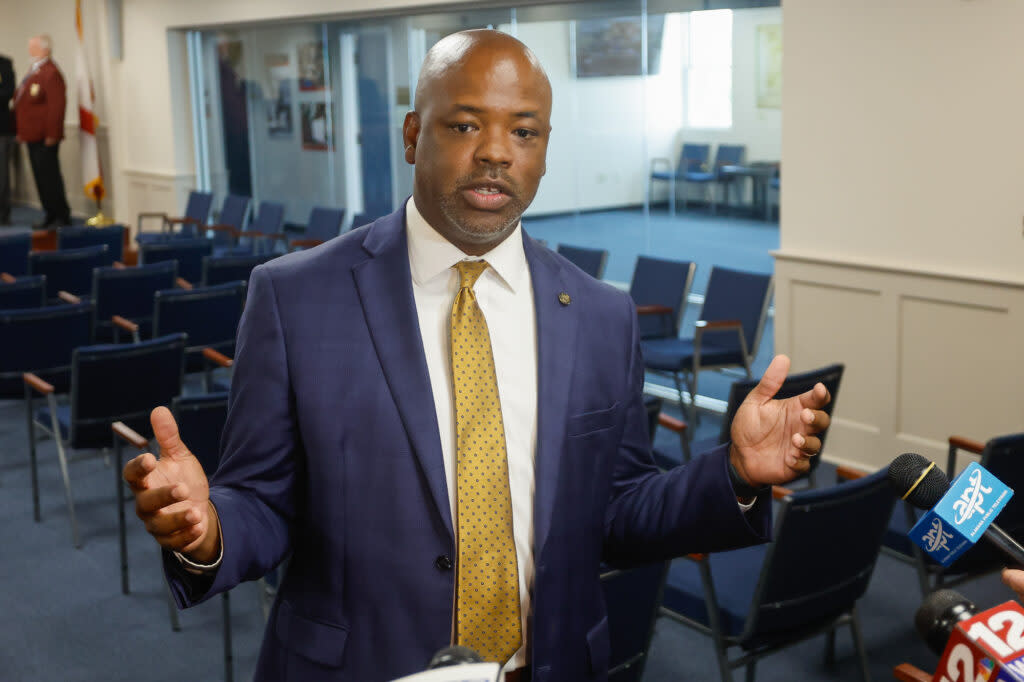House Judiciary Committee wants changes to medical parole bill

Rep. Chris England, D-Tuscaloosa, speaks with reporters following a conference committee meeting during a special session on redistricting on Friday, July 21, 2023 in Montgomery, Alabama. (Stew Milne for Alabama Reflector)
The House Judiciary Committee Wednesday delayed consideration of a bill that would allow the Alabama Board of Pardons and Paroles to take medical conditions into account when making parole decisions.
HB 299, sponsored by Rep. Chris England, D-Tuscaloosa, was referred to a subcommittee for further review after members expressed discomfort with some of the provisions in the bill.
“This is not a mandatory release in any circumstance,” England said. “Discretion still rests with the parole board to determine release or not. It just gives weighted consideration for age, and weighted consideration for health condition.”
GET THE MORNING HEADLINES DELIVERED TO YOUR INBOX
Health issues are not generally considered when making decisions for parole.
Overcrowding has become an ongoing problem within Alabama’s prisons. Criminal justice reform advocates have accused the Board of Pardons and Paroles of exacerbating the problem by dramatically limiting the parole rate. Alabama Department of Corrections Commissioner John Hamm told legislators on Tuesday that he would “like to see more individuals get an opportunity to get out.”
According to the ACLU of Alabama, about 7% of people who were incarcerated and applied for parole were granted it in July and August 2023.
England’s legislation would also reduce the amount of time that a person must wait before the Board of Pardons and Paroles can reconsider an applicant for parole. People who are incarcerated can wait up to five years before the parole board will consider their application once again. According to the bill, those convicted of a nonviolent offense, and are sentenced to at least 20 years who are denied parole will wait two years.
Those who are at least 60 years old and have served 10 years or more of their sentence will also be considered for parole in two years if they are denied. If the Board denies them parole, the members will provide them with a plan for increasing their chances of getting parole the next time.
If members of the board fail to do that, the applicant will reconsider releasing the person after 90 days.
Those with a serious medical condition, defined as “any non-terminal physical or medical condition rendering an individual permanently and irreversibly incapacitated as determined by reasonable medical judgment,” may appeal the Board’s decision within 28 days should they be denied parole.
Those who want to appeal their decision may do so in the circuit court of the county where they were convicted.
The bill is meant to address the cost of incarcerating older inmates. . As people age, they have additional health concerns that require accommodation.
“Our prison system is turning into a health care system,” England said. “A smaller percentage of the population continues to balloon; they are becoming more expensive to take care of. Over the course of several years, they become less of a concern toward public safety.”
In 2023, the Alabama Department of Corrections presented the Contract Review Committee with a health contract worth more than $1 billion.
Republicans on the committee expressed skepticism.
“This means that if somebody is 60 years old and has been convicted of murder, they shall be heard every two years,” Rep. Matt Simpson, R-Daphne said. “If somebody is convicted of a rape, they shall be heard every two years. If somebody is convicted of kidnapping, they shall be heard every two years. Every time you are having a victim who has to come back up to oppose someone getting paroled, they are going to have to come up every two years.”
In the end, members thought there were several changes that needed to be made before it could be voted on, so it was referred to a subcommittee. The measure could be voted on as early as next week.
There are only ten days left in the current session.
The post House Judiciary Committee wants changes to medical parole bill appeared first on Alabama Reflector.

